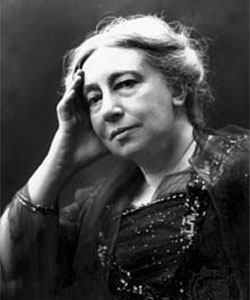Lady Gregory was born Augusta Persse at her family's Co. Galway Big House, Roxborough, in 1852. In 1880, she married Sir William Gregory of Coole Park outside Gort, Co. Galway; he was (like her own family) Unionist in politics, and his record during the Famine was rather disturbing. During the crisis, he had sponsored the Gregory Clause, which stated that tenants who possessed holdings over a certain size had to give up their land if they wanted to receive relief. This was, of course, long before Lady Gregory married him, but it gives a sense of the political atmosphere of her married household. In 1881, she met the English anti-imperialist poet, Wilfrid Scawen Blunt, and conducted a passionate 18-month affair with him. This inspired some of her first attempts at literature: she wrote a series of sonnets about their relationship, which Blunt published anonymously in one of his volumes of poetry as "A Woman's Sonnets". The affair was also noteworthy in that she bonded with Blunt over his anti-imperialist views and came to share them.
After the death of her husband in 1892, her increasingly ardent Irish Nationalist sympathies manifested themselves in her study of the Irish language and her collecting of Irish folklore. She published her re-tellings of Irish mythology in a consciously-heightened form of Hiberno-English, which she called “Kiltartanese” (named for the barony where most of her tenants lived). She later used this dialect in her plays as well, and Kiltartanese was an important influence on the dialect used by J.M. Synge in his plays.
In 1896, Gregory met W.B. Yeats at the home of her neighbour, a Big House Catholic landlord called Edward Martyn, and this meeting changed all of their lives forever. Together, the three of them co-founded the Irish Literary Theatre (precursor to the Abbey Theatre) in 1899. Gregory co-directed the Abbey with Yeats from its founding in 1904 until her death in 1932 (between 1905 and his death in 1909, Synge served as a third co-director). Gregory also supported Yeats artistically and materially for many years, allowing him to spend long writing holidays at Coole Park and collaborating with him on some of his early plays. For decades, her contributions to his drama, including her co-writing of the important Nationalist play Cathleen ni Houlihan (1902), were suppressed; now, however, her contributions are fully acknowledged.
Lady Gregory eventually began writing plays on her own, and, for many years after the Abbey's founding, these were some of the theatre's most popular productions. Standout works include The Rising of the Moon (1903), in which Gregory shows remarkable understanding of and sympathy with the Nationalist cause for someone from a Unionist Big House background; Spreading the News (1904), in which she lampoons the rural Irish hunger for gossip; and McDonough's Wife (1913), which builds to a crescendo in which an ornery and proud piper pays eloquent and moving tribute to his late spouse, Irish folk traditions, and Galway city.
Gregory's masterpiece is Grania (1912), a re-telling of the Diarmuid and Gráinne legend in which she reflects once again on her affair with Blunt. Yeats's dislike for the play, combined (possibly) with her reluctance to publicly stage such personally-revealing material in Ireland, resulted in the play not being produced at the Abbey at the time of composition. Indeed, as hard as it may be to believe, the play only had its Irish professional premiere in the autumn of 2024, when it was the Abbey's contribution to the annual Dublin Theatre Festival. This Grania production confirms that contemporary theatremakers are, at long last, rejecting the decades-long, misogynistic attempts to malign Gregory's excellent dramatic output: since 2020, her plays have been produced by high-profile makers such as the Irish Repertory Theatre, Druid Theatre Company, Joe Devlin's Directions Out Theatre Company, and Paul Brennan's Doorknockers Theatre Company.
Plays
- Cathleen ni Houlihan (co-written with W.B. Yeats) (1902)
- The Rising of the Moon (1903)
- Spreading the News (1904)
- Grania (1912)
- McDonough's Wife (1913)
Find out more
For more on this playwright from an Irish Studies perspective, see the chapter on Lady Gregory in Cathy Leeney's book, Irish Women Playwrights, 1900-1939 (2010).

